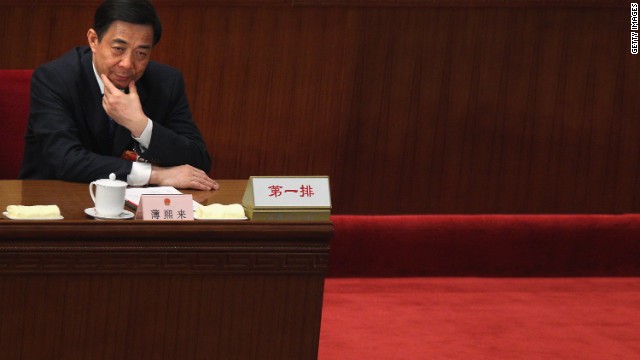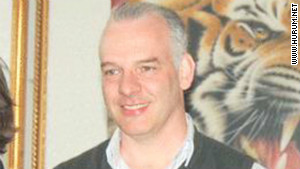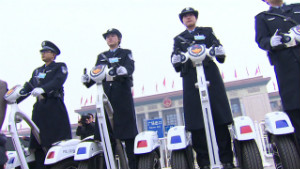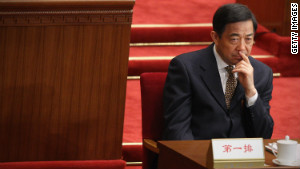
- Britain asks China to investigate the mysterious death of a businessman
- Neil Heywood was found dead in November in a Chinese hotel
- He had ties to a company formed by former officers of the UK's spy agency
- The mystery is part of a story that goes to the inner sanctum of China's Communist Party
Beijing (CNN) -- "Please excuse me, I can't talk about this."
Clunk! The phone line goes dead.
We had tried to get this British businessman to talk about the mysterious death of Neil Heywood.
Heywood has emerged from the shadows to be a key link in a story of intrigue, mystery and betrayal that goes all the way to the inner sanctum of China's secretive Communist Party.
Heywood was found dead last November in his hotel room in the sprawling southwestern Chinese city of Chongqing. According to media reports, local authorities quickly ruled his cause of death as "excessive alcohol use." An autopsy was not performed, media reports said, and his body was cremated.
Slowly, however, media reports are raising more uncomfortable questions about Heywood's death. He was married to a Chinese woman and had business interests in the country. He moved in the orbit of a company known as Hakluyt and Co., a British strategic information consultancy formed by former officers of the UK's spy agency MI6.
Hakluyt has released a statement on Heywood, saying, "We had a long history of advising Western companies on China and we are among those who sought (Heywood's) advice. We are greatly saddened by his death."
 Dead UK businessman and the 'princeling'
Dead UK businessman and the 'princeling'  Infighting in Chinese Communist Party
Infighting in Chinese Communist Party  Reaction mixed to Bo Xilai's ouster
Reaction mixed to Bo Xilai's ouster Now, the British government is asking China to investigate Heywood's death.
"Our embassy in Beijing and consulate general in Chongqing provided consular assistance to the family, as we would in any case involving a British national overseas," the Foreign and Commonwealth Office said. "We recently asked the Chinese authorities to investigate the case further after we heard suggestions that there were suspicious circumstances."
Heywood's family has denied comment.
CNN has spoken to a man who says he knew Heywood, but who would not speak publicly because he was worried about his safety. He confirmed the dead man had business in China and said that for someone who supposedly died from an alcohol binge, in his experience Heywood was not a heavy drinker.
Heywood's death on its own -- a man linked to former spies, a light drinker dead from apparent alcohol poisoning -- would be suspicious enough. But this case has more -- much more.
Heywood has been linked to the scandal and sacking of a man once seemingly destined for the heights of power in China.
The rise and fall of China's Bo Xilai
Bo Xilai is what is known as a "princeling," the son of a Maoist-era revolutionary hero. Bo rose through China's political ranks and was appointed Communist Party secretary of Chongqing, a city of more than 30 million people.
He quickly became known as an anti-crime crusader. Bo smashed criminal gangs and locked up corrupt businessmen.
He won praise from locals, especially the poor. Migrant workers flocked to Chongqing seeking, and often finding, a better life.
But Bo also made enemies. He relied heavily on Maoist slogans and revived cultural revolutionary songs. In a country embracing capitalism, Bo cultivated an image as "redder than red."
Just last month, however, Bo's career started to unravel. His right-hand man and former top cop Wang Lijun spectacularly sought refuge in an American consulate.
China axes Bo Xilai from Chongqing after scandal
Wang wanted asylum, apparently fearing for his life and allegedly holding incriminating information on his old boss.
This is where Heywood re-enters the picture. The Wall Street Journal, quoting anonymous diplomatic sources close to the case, reports Wang clashed with Bo after raising his suspicions that Heywood had been poisoned.
After leaving the U.S. consulate, Wang was taken away by state police and has not seen or heard from since. Less than two weeks ago, Bo was fired from his position, his career and ambitions to enter the politburo standing committee -- the nine men who run China -- shattered. Bo has not been seen in public since.
In a year of political transition in China, with a new generation of leaders poised to inherit power, the Bo case has captivated the country.
In the rowdy back streets of Chongqing locals gamble, drink and discuss Bo's downfall. On a recent visit by CNN, they praised their former party boss. Some of them openly mocked Vice President Xi Jinping, the man likely to be China's next supreme leader.
"This is a battle of the gods, not ordinary people," said one old man, who has seen leaders and revolution come and go.
But the gods who made the law in Chongqing are now themselves under investigation.
Bo, the man who ran the criminals out of town, now finds himself ousted. And Heywood, found dead in a Chongqing hotel room, may still yet have a tale to tell.


